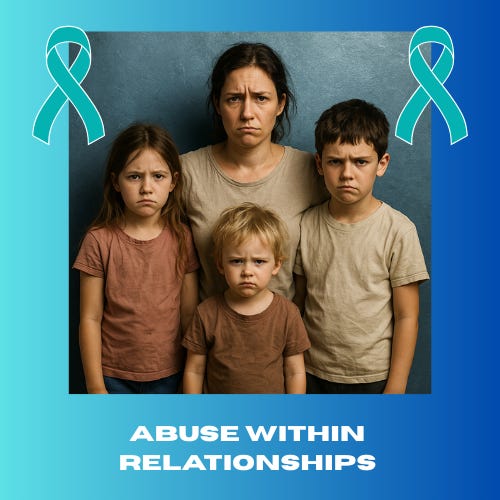Abuse Within Relationships
The Hidden Battle
Abuse within relationships is a complex and painful issue that often goes unnoticed, especially among those who are expected to be strong—veterans, first responders, police officers, and working professionals. You are the protectors, the ones who face danger head-on, yet many of you may find yourselves in relationships that are anything but safe. Abuse can take many forms: physical, emotional, and psychological. It can leave deep scars, especially for those already grappling with PTSD, C-PTSD, or burnout.
When abuse occurs, it doesn’t just affect the individuals involved; it creates a ripple effect that can impact children and families for generations. Understanding this dynamic is crucial for healing and breaking the cycle of trauma.
The Cycle of Abuse: Why It’s So Hard to Leave
Abuse often operates in a cycle that can be difficult to escape. Victims may find themselves caught in a pattern of harm followed by apologies and promises of change. The abuser may say, “I’m sorry, it won’t happen again,” and the victim, hoping for a better future, may return to the relationship. This cycle can be particularly damaging for those with PTSD, as the emotional turmoil can trigger past traumas, making it even harder to break free.
For divorced couples, the situation can become even more complicated. When children are involved, the stakes are higher. Children may witness the abuse or feel the tension in the home, leading to their own emotional and psychological struggles. They may feel torn between parents, experiencing guilt or confusion about the situation.
The Impact on Children: A Lasting Legacy
Children who witness domestic abuse are at risk for both short-term and long-term effects. In the short term, they may experience anxiety, difficulty sleeping, or behavioral issues. They might act out in school or withdraw from friends, feeling isolated and unsure of how to express their feelings.
Long-term effects can be even more severe. Children exposed to domestic abuse are more likely to struggle with mental health issues, such as anxiety and depression, and may engage in risky behaviors as they grow older. They might also develop a lowered sense of self-worth, believing that the chaos they witnessed is a regular part of everyday life or that they somehow caused it.
Divorce can further complicate these issues. Children of divorced parents often face additional challenges, including instability in their living situations and emotional distress from the separation. Research shows that these children are at a higher risk for substance abuse, academic struggles, and difficulties in their relationships later in life. The trauma of witnessing abuse can set a precedent for how they view relationships, potentially leading them to repeat the cycle of dysfunction.
The Intersection of Abuse and PTSD
For those already dealing with PTSD, the effects of abuse can be particularly pronounced. The heightened sensitivity to stress and trauma can make it difficult to navigate an abusive relationship. Triggers—such as loud arguments or aggressive behavior—can evoke flashbacks or panic attacks, intensifying the emotional turmoil.
In abusive relationships, the abuser may exploit these vulnerabilities, using manipulation and coercion to maintain control. They might dismiss the victim’s feelings or blame them for the abuse, further entrenching the victim in a cycle of shame and self-doubt. This dynamic can make it incredibly challenging for victims to seek help or leave the relationship, as they may feel trapped by their circumstances.
Breaking Free: Finding Support and Healing
Recognizing the signs of abuse is the first step toward breaking free. If you or someone you know is in an abusive relationship, it’s essential to reach out for help. Support can come from friends, family, or professional resources such as therapists and hotlines.
For parents, it’s crucial to consider the impact of their relationship on their children. Seeking help not only benefits you but also sets a positive example for your children to follow. It teaches them that it’s okay to seek support and that they deserve to be in healthy, loving relationships.
Healing from both abuse and PTSD is a journey, but it can lead to a brighter future. Therapy can provide a safe space to process trauma, learn coping strategies, and rebuild self-esteem. Support groups can connect you with others who understand your experiences, reminding you that you are not alone.
Closing Thoughts: You Deserve Peace
To all the veterans, first responders, police officers, and professionals reading this: you are not defined by the abuse you’ve endured. You are strong, resilient, and worthy of love and respect. The scars of abuse and PTSD are real, but so is your capacity for healing.
You have faced unimaginable challenges before, and this is another battle you can win. Remember, you are not alone, and a community is ready to support you. Take the first step toward healing. You deserve a life free from fear, filled with peace and love.
Where to Find Help
If you or someone you know is experiencing abuse, it's crucial to reach out for help. Here are some resources that can provide support:
National Domestic Violence Hotline: Call 1-800-799-SAFE (7233) or visit their website at www.thehotline.org for confidential support and resources.
RAINN (Rape, Abuse & Incest National Network): Visit www.rainn.org or call 1-800-656-HOPE (4673) for support related to sexual assault and abuse.
Substance Abuse and Mental Health Services Administration (SAMHSA): Call 1-800-662-HELP (4357) or visit www.samhsa.gov for resources related to mental health and substance abuse.
Local Support Centers: Many communities have shelters and support groups for victims of domestic violence. Look for local organizations that can provide assistance and resources.
You are not alone in this fight. Reach out, seek help, and take the first step toward a safer, healthier future.
2025© www.soundthetrumpet.org







